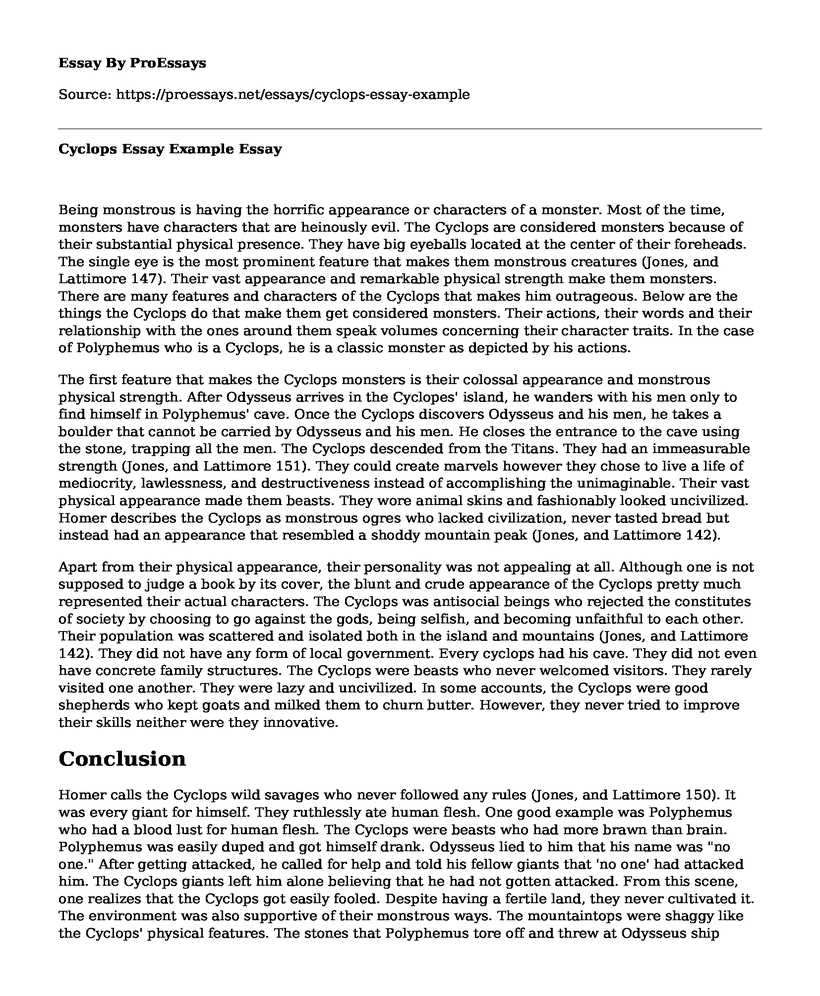Being monstrous is having the horrific appearance or characters of a monster. Most of the time, monsters have characters that are heinously evil. The Cyclops are considered monsters because of their substantial physical presence. They have big eyeballs located at the center of their foreheads. The single eye is the most prominent feature that makes them monstrous creatures (Jones, and Lattimore 147). Their vast appearance and remarkable physical strength make them monsters. There are many features and characters of the Cyclops that makes him outrageous. Below are the things the Cyclops do that make them get considered monsters. Their actions, their words and their relationship with the ones around them speak volumes concerning their character traits. In the case of Polyphemus who is a Cyclops, he is a classic monster as depicted by his actions.
The first feature that makes the Cyclops monsters is their colossal appearance and monstrous physical strength. After Odysseus arrives in the Cyclopes' island, he wanders with his men only to find himself in Polyphemus' cave. Once the Cyclops discovers Odysseus and his men, he takes a boulder that cannot be carried by Odysseus and his men. He closes the entrance to the cave using the stone, trapping all the men. The Cyclops descended from the Titans. They had an immeasurable strength (Jones, and Lattimore 151). They could create marvels however they chose to live a life of mediocrity, lawlessness, and destructiveness instead of accomplishing the unimaginable. Their vast physical appearance made them beasts. They wore animal skins and fashionably looked uncivilized. Homer describes the Cyclops as monstrous ogres who lacked civilization, never tasted bread but instead had an appearance that resembled a shoddy mountain peak (Jones, and Lattimore 142).
Apart from their physical appearance, their personality was not appealing at all. Although one is not supposed to judge a book by its cover, the blunt and crude appearance of the Cyclops pretty much represented their actual characters. The Cyclops was antisocial beings who rejected the constitutes of society by choosing to go against the gods, being selfish, and becoming unfaithful to each other. Their population was scattered and isolated both in the island and mountains (Jones, and Lattimore 142). They did not have any form of local government. Every cyclops had his cave. They did not even have concrete family structures. The Cyclops were beasts who never welcomed visitors. They rarely visited one another. They were lazy and uncivilized. In some accounts, the Cyclops were good shepherds who kept goats and milked them to churn butter. However, they never tried to improve their skills neither were they innovative.
Conclusion
Homer calls the Cyclops wild savages who never followed any rules (Jones, and Lattimore 150). It was every giant for himself. They ruthlessly ate human flesh. One good example was Polyphemus who had a blood lust for human flesh. The Cyclops were beasts who had more brawn than brain. Polyphemus was easily duped and got himself drank. Odysseus lied to him that his name was "no one." After getting attacked, he called for help and told his fellow giants that 'no one' had attacked him. The Cyclops giants left him alone believing that he had not gotten attacked. From this scene, one realizes that the Cyclops got easily fooled. Despite having a fertile land, they never cultivated it. The environment was also supportive of their monstrous ways. The mountaintops were shaggy like the Cyclops' physical features. The stones that Polyphemus tore off and threw at Odysseus ship confirms that physical environment supported their monstrous nature. In conclusion, every single element mentioned above played a part in making the Cyclops seem more of monstrous creatures.
Works Cited
Jones, P. V, and Richmond Lattimore. Homer's Odyssey. Bristol Classical Press, 2004, pp. 137-151.
Cite this page
Cyclops Essay Example. (2022, Aug 15). Retrieved from https://proessays.net/essays/cyclops-essay-example
If you are the original author of this essay and no longer wish to have it published on the ProEssays website, please click below to request its removal:
- Dissertation Chapter Example: A Survey of Rita Dove's Poetry of the 1980s and 1990s
- "Inherit the Wind" Play Essay
- Unicorns Essay Example
- Literary Analysis Essay on Phoniness and Authenticity in The Catcher in the Rye
- The Portrayal of Love in Romeo and Juliette - Literary Analysis Essay
- Compare and Contrast Macbeth and Lady Macbeth Essay
- Essay on The Ferryman: Act 3 Scene - A Thatcher-Era Guerrilla War







